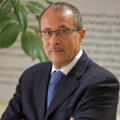It is no longer possible to ignore the impact of three important developments that have ushered the Palestinian cause into a new, more challenging and less suitable political environment - one that requires a radical review of the mechanisms of Palestinian political action.
The first is the uncertainty in or the collapse of the Arab political system; the second are recent radical transformations in Israel; and the third is the election of Donald Trump as president of the United States.
The crippling changes in the Arab world have made it immeasurably less capable of providing support for the Palestinian people. With some exceptions related to Palestinian-Arab relations, the Arab peoples (and often many Arab governments), have consistently acted as a supportive incubator for the Palestinian struggle at its major political junctions.
The Palestinian Liberation Organization (PLO) was established with the support of revolutionary regimes at the time, and in its early years, the Palestinian struggle was launched from neighboring Arab countries. Furthermore, Palestinian diplomatic achievements had Arab support, starting with Fatah’s relationship with China with the help of Algeria, then the PLO’s relationship with the Soviet Union, mediated by Egypt, and then Palestinian representation in western capitals through the Arab League offices in the seventies. These came in addition to the Arab League’s support for important international resolutions.
While it is true that the United States, including the current administration, has provided Israel with the maximum possible support, including preventing the world from condemning its settlement activities and other violations of international law, Trump’s election will set the stage for an even more harmonious relationship between him and Israeli Prime Minister Benjamin Netanyahu, who recently predicted that the relationship between Israel and Trump would be warm. This recalls the “warm relations” between Netanyahu and Russian President Vladimir Putin, for whom Trump expressed his admiration during his election campaign.
The nomination of David Friedman as U.S. ambassador to Israel by president-elect Donald Trump, is another confirmation of our fears. Friedman, according to Haaretz, is an Orthodox Jew who maintains a part-time residence in Israel and heads a group that has provided millions in funding for the Bet El settlement in Ramallah. This is one more indicator that the era of Trump-Netanyahu will spell the end of the two-state prospect.
As for Israel, it is no longer the same entity that negotiated with the PLO 25 years ago. Its socio-economic and demographic structure has changed, falling into what writer Sami Michael called in Yediot Aharonot the “defiled trinity” of corrupt government, devouring wealth, and a violent messianic religion. Over half of its cabinet members openly reject the two-state solution, as cited by close Israel friend John Kerry at the recent Saban Foundation meeting in Washington. Their top priority, according to Haaretz’ Uri Savir is to bury the two-state solution in a “settlement tsunami.”
Two basic conclusions can be drawn from this changing reality. First, the prospects for a solution that provides an end to the occupation through bilateral negotiations with Israel is unlikely in the foreseeable future, which ultimately requires us to find new political approaches. Second, external, Arab, international and Israeli factors are unfavorable and require that the focus be shifted to subjective factors while preserving the limited external support still at hand, including popular support.
Can Palestinian political elites move from merely diagnosing the situation to taking action accordingly? Diagnosing the situation and what should be” is the prerogative of professors and academics, but the task of politicians is to work towards actually changing it.
Internally, the conference of Palestine’s leading Fatah faction has ended with the election of a new leadership for the coming years. The conference succeeded in renewing the leadership’s legitimacy, providing it new impetus and achieving the desired stability. After all their struggles then, is the public not entitled to hope that these benefits will include them in addressing other related obligations such elections for the municipal councils, the Palestine National Council (the PLO’s representative body), the Palestinian Authority’s Legislative Council and so on?
In order to further strengthen Palestine internally, it is also important that the political leadership pays greater attention to its obligations in the performance of public institutions, especially service-related ones, after the noticeable decline in basic education and health services. This is in addition to the economy, where negative indicators, especially unemployment rates, are on the rise. Moreover one hopes for an official denial to put to rest rumors that certain heads of the Supreme Judiciary Council signed resignations in advance to guarantee their loyalty to the executive authority.
At the political level, the most fitting approach for the new situation includes the replacement of bilateral negotiations with a strategy of international diplomacy, thus rendering international law and international institutions as the battleground with the occupier.
This should happen in parallel with interaction and integration between international and public diplomacy seeking to promote boycott, foreign divestment and sanctions from Israel as long as it is occupying Palestinian land and violating Palestinian rights.
|
This article was adapted from an Arabic version published at al-Quds newspaper.
|
Published in: Jerusalem Media and Communication Centre


